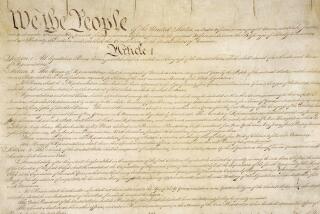This Document Should Make America Nervous
- Share via
Before the proposed European Union constitution was written, a malaise had begun to creep over the old EU of 15. Why on Earth did we need to invite 10 underdeveloped and undemocratic Eastern European countries to join our club when we already had enough problems of our own? Think of former British Prime Minister Margaret Thatcher, who wanted “her” money back from Brussels.
We had barely nursed the Portuguese back to health, and now 10 open mouths awaited subsidies from Brussels.
For the record:
12:00 a.m. June 5, 2005 For The Record
Los Angeles Times Sunday June 05, 2005 Home Edition Opinion Part M Page 3 Editorial Pages Desk 1 inches; 32 words Type of Material: Correction
European Union -- An article in last week’s Sunday Opinion referred to Czechoslovakia joining the European Union. Czechoslovakia dissolved in 1993. The Czech and Slovak republics joined the EU separately in 2004.
Meanwhile, their cheap labor has poured in and stolen our jobs by working for three euros an hour when we ask 10. Our economies have stalled, high jobless rates show no signs of falling anytime soon, and social security systems are crumbling.
With the future so uncertain, many Europeans are unwilling to take risks -- and the recent growth of the EU strikes many as too risky. Current beneficiaries of billions in subsidies will have to share them with the new, poorer union members.
This resistance is unfortunate.
The draft constitution that the French will vote on today is the best that could be designed to accommodate the wishes of the EU’s 25 members.
It is a rational compromise, as much of a historical necessity as the Baltics and Czechoslovakia joining the union was a historical necessity.
Europeans tend to take fewer risks than Americans -- which is why they are so apprehensive. But what seems to be a risk now will later turn into a benefit. The coming of the constitution is fortunate because it will strengthen the new union by giving it the tools for better organizing its affairs, speaking with a single voice and formulating common economic and political goals as a transatlantic strategy. It will anchor Europe’s future as a network of 25 countries while leaving each country its national freedom.
Do not underestimate the future power of the EU. The new Europe has strong political and cultural traditions. With an expanding market, it will revitalize its economy. And with a constitution, Europe will have, more than ever, the chance of becoming a global player with real political power. Watch out, America, here we come.
More to Read
Sign up for Essential California
The most important California stories and recommendations in your inbox every morning.
You may occasionally receive promotional content from the Los Angeles Times.










